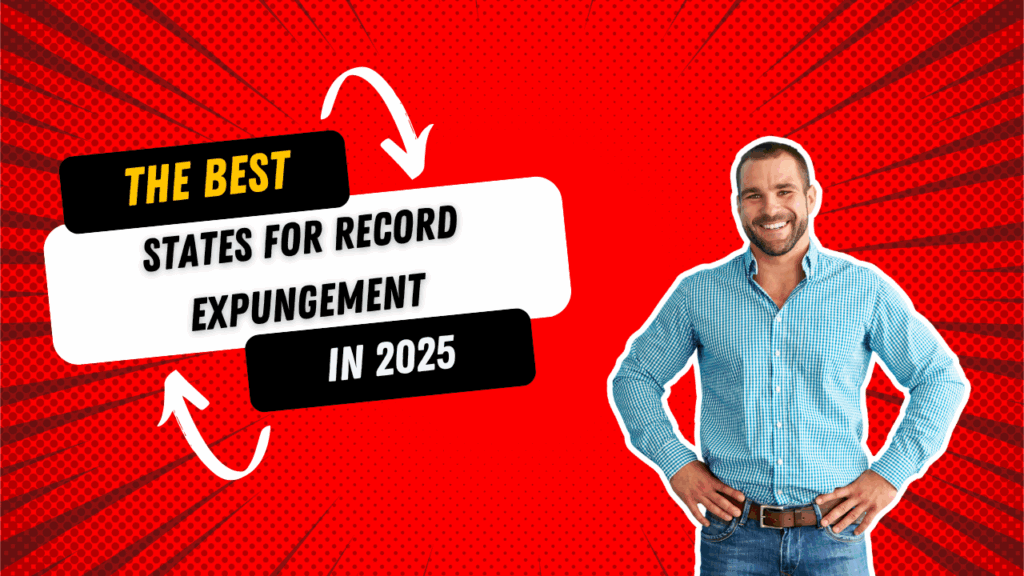What makes a state “expungement friendly”?
Not all states treat criminal records the same. Some make it nearly impossible to clear your name. Others have opened the door wide for second chances.
An expungement-friendly state usually has:
- Clear laws on who qualifies
- Faster timelines for filing
- Automatic clearing for certain cases
- Lower costs or fee waivers
- Strong privacy protections
The best states hit more than one of these marks. Let’s break it down.
Dig Deeper: How to Remove Court Records from Google Search
Top states leading in 2025
California
California is one of the most progressive states for expungement. It allows many misdemeanors and even some felonies to be expunged. In 2023, the state expanded automatic record relief. Now, over 11 million cases are eligible.
You still need to file paperwork for older convictions, but the path is clear. The state also bars employers from asking about expunged records in many cases.
Michigan
Michigan passed a major law in 2020. It launched automatic expungement for low-level offenses in 2023. The system is working. As of mid-2024, more than 1 million records had been cleared.
People with multiple convictions can now petition more easily. And drug offenses are treated more fairly than in many other states.
Pennsylvania
Thanks to its “Clean Slate” law, Pennsylvania has sealed millions of records. If you stayed clean for 10 years after a misdemeanor, chances are it’s already sealed.
Felony expungement is harder here. But for nonviolent offenses, this is one of the best states in the Northeast.
Utah
Utah doesn’t get enough credit. It was the second state to launch automatic expungement. It also offers low-cost options and has a fast court process for most requests.
In fact, Utah’s Clean Slate law was used as a model for several other states.
New Jersey
New Jersey made sweeping changes in 2020. The process is now online and much faster. You can expunge up to four disorderly persons offenses or one felony.
If your case was dismissed or resulted in no conviction, expungement is free and usually automatic.
Other standouts
- Illinois: Marijuana expungement laws are strong. The state has cleared hundreds of thousands of records.
- Connecticut: Automatic expungement kicked in during 2023 for many misdemeanors.
- Missouri: Offers relief for over 1,900 offenses, including many felonies.
- South Dakota: One of the fastest court processing times.
- New Mexico: One of the few states that allows expungement of dismissed cases and arrests with no conviction.
States that still make it hard
While progress is being made, some states remain restrictive.
- Texas: Only allows expungement in limited cases like wrongful arrests or pardons.
- Florida: Requires complex paperwork and court approval, with long waits.
- Georgia: Offers “record restriction” but it’s not as strong as full expungement.
- Wisconsin: Has strict limits on which offenses can be cleared.
- Nebraska: No expungement. At all.
If you live in a tough state, consider getting legal help. Some attorneys specialize in expungement work across state lines.
How to start the process
No matter your state, here are the first steps:
- Get a copy of your record
This might come from the state police or local court. Make sure it’s complete. - Check your state’s rules
Visit your state’s court website. Look up “expungement eligibility” for your type of offense. - Apply or wait for automatic clearing
If your state has automatic expungement, your record may be cleared without action. But if not, you’ll need to fill out and submit a request. - Follow up
Keep a copy of the final court order. You may need it later for background checks.
Online records are a separate battle
Even after a court clears your record, it might still be online. Background check sites are slow to update. Some don’t update at all.
That’s where a reputation management service can help. These services contact third-party sites and push to remove old listings. Some use court orders. Others use legal tools like DMCA notices or privacy complaints.
If you’re seeing your expunged case pop up on Google, that’s your best bet for getting it taken down fast.
Key stats to know
- Over 70 million Americans have a criminal record
- 1 in 3 adults in the U.S. may be affected by background check errors
- Only 20 states currently offer some form of automatic expungement
- Automatic clearing rates vary. Michigan cleared 1M+ in under a year, but others lag behind
Final thoughts
Your state matters. But so does what you do next.
If you’re in one of the best states, great. File your paperwork or check to see if it’s already been done for you. If you’re in a tougher state, you may still have options with legal help or alternative sealing programs.
Either way, don’t stop at the courthouse. Keep an eye on what shows up online. The law may clear your record, but the internet takes more work.
Want help making sure your cleared record stays off search engines? Contact a team that understands how to fight for your clean slate, both offline and on Google.
Need help? Top Shelf Reputation specializes in managing court records online, even when they can’t be fully removed. Contact us today to take back control of your online image.

